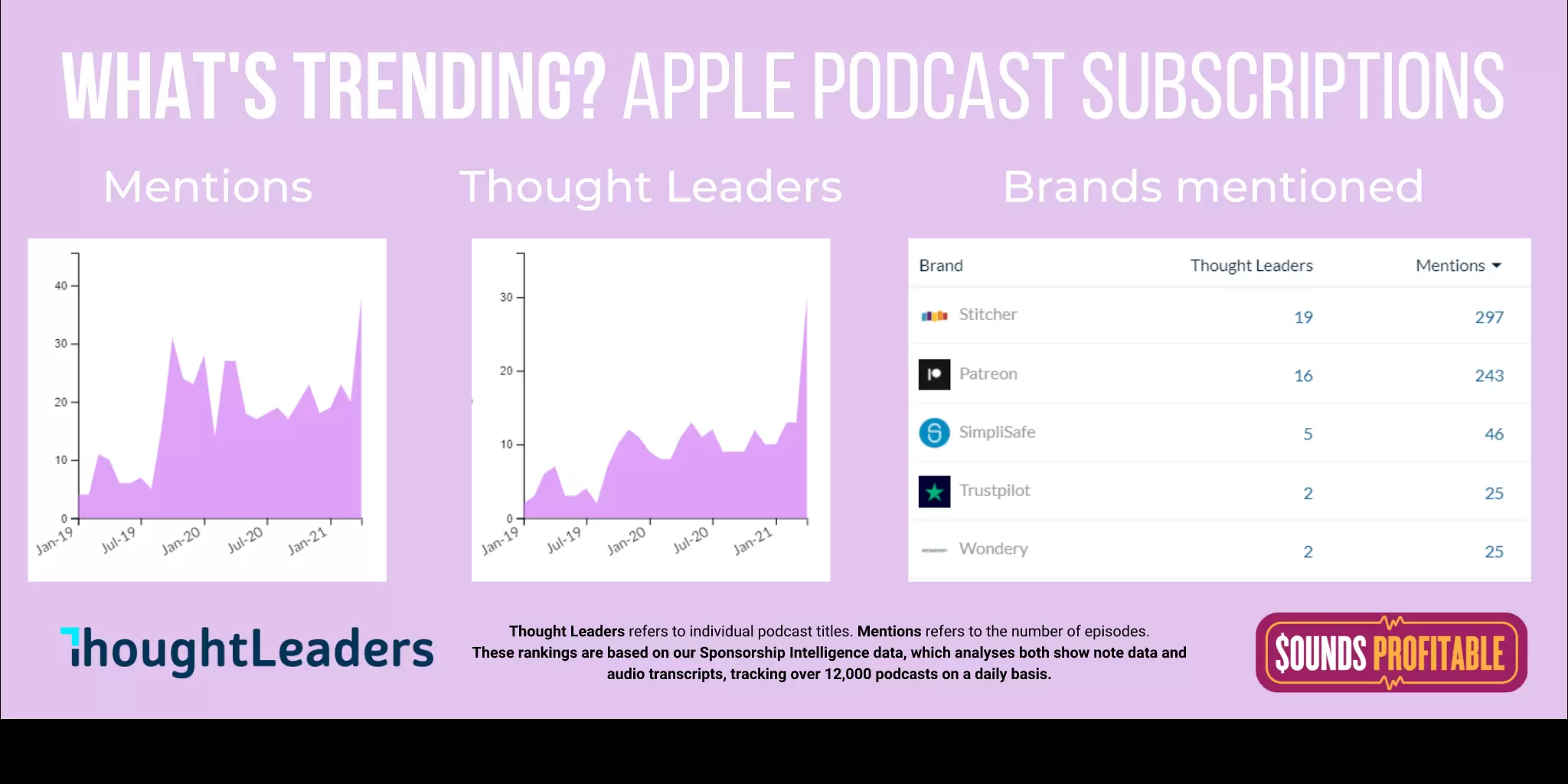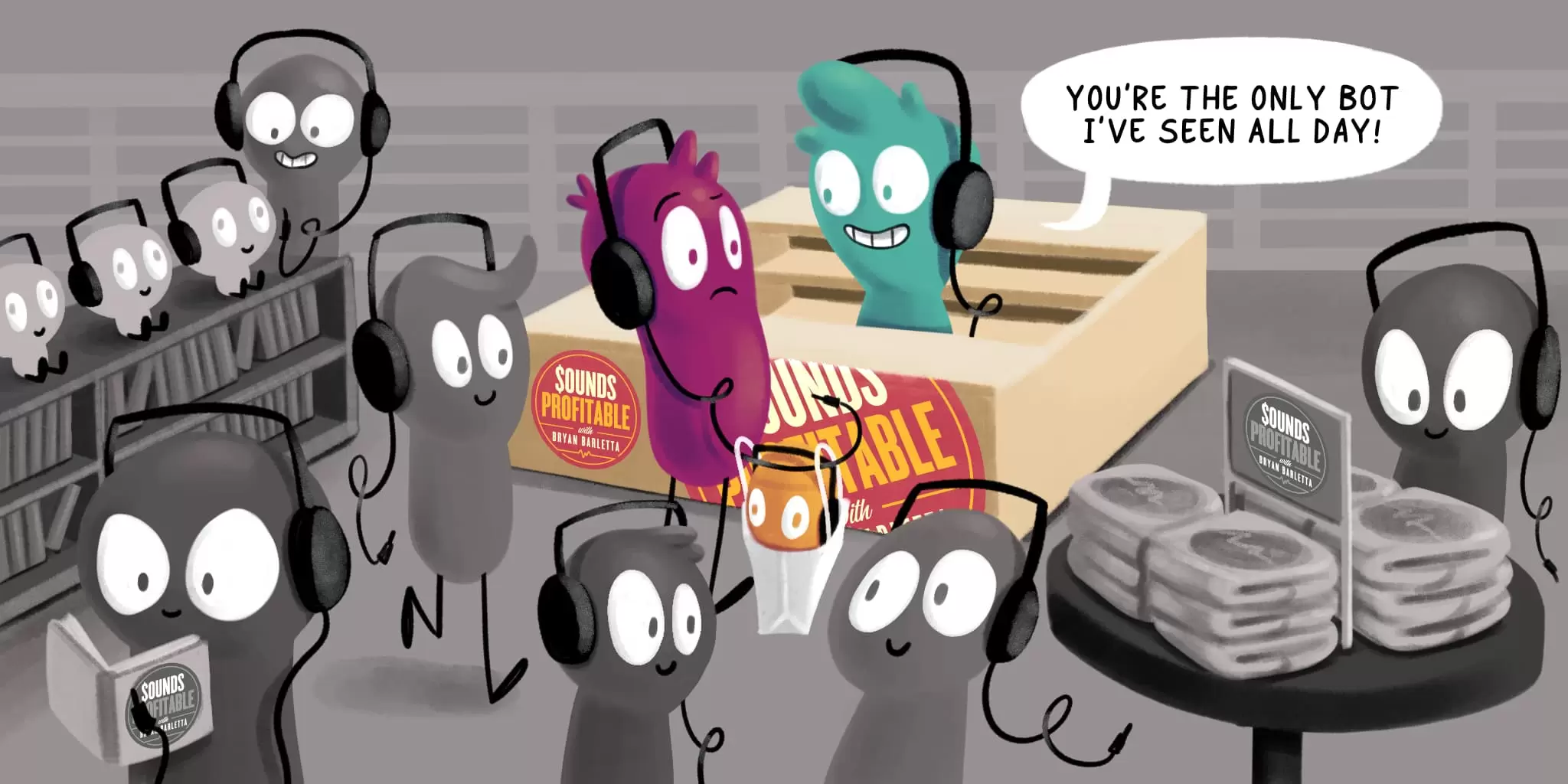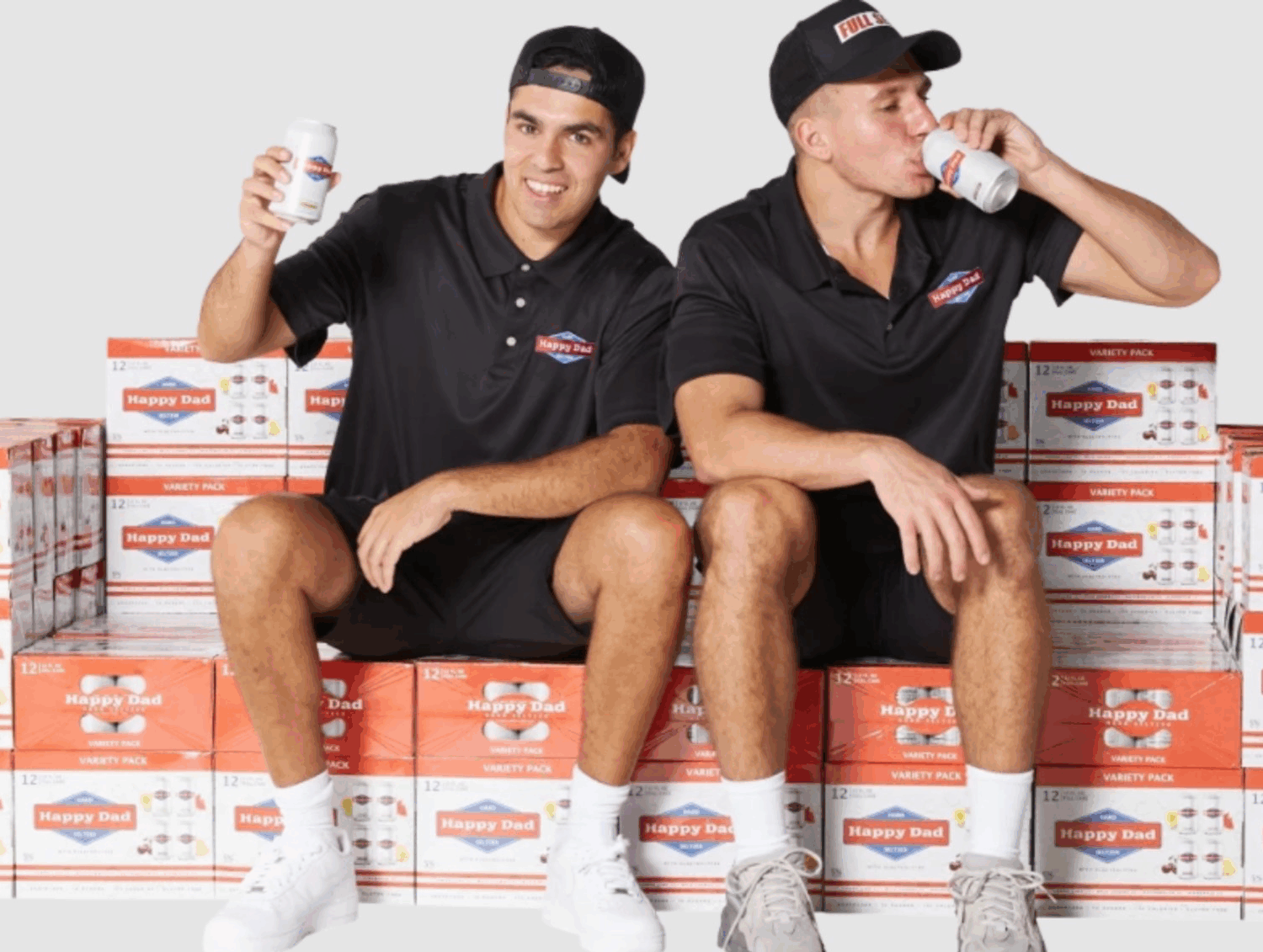Dane Cardiel, Director, Business Development, Podcasts at SiriusXM/Simplecast joins me to dig deeper into why I think Post-roll is Bullshit. You can find it completely free on my Premium Feed, along with a narrated version of today’s article posted on Wednesday.
Introduction
No method of advertising attribution is perfect.
Regardless of the medium, there’s no way to capture every aspect of a listener’s journey from ad exposure all the way to the desired conversion action. And even if we could monitor every aspect, we can’t read minds (yet) to figure out how effective the advertisement was through surveying every single member of the audience without expecting some level of bias. But perfect is the enemy of good, as they say. And in podcast advertising, we’ve got it pretty good.
For most of my time in this space, marketers have tried to convince me that both promo codes/vanity URLs and pixel-based solutions were on equal footing. But today, we’re going to break down why pixel-based solutions should be at the forefront of your attribution strategy, and you should only fall back to promo codes and vanity URLs when there’s no other option.
Understanding the Funnel
Hulu is one of my favorite examples to use when discussing a sales funnel.
Hulu’s homepage spends about 25% of its real estate at best explaining what Hulu is, with the other 75% focused on telling you what you can buy. Almost everything you can click on will bring you immediately to another page dedicated to breaking out the purchase options, or fast-track you right to account creation for a specific option.
Unless you pick the bundle that includes Hulu, ESPN+, and Disney+, every signup option includes a free trial. Every user gets between seven and thirty days of free access to Hulu just by entering the standard account creation info and adding in billing information for when the free trial expires.
Hulu understands that successful advertising is all about the handoff. A well-crafted campaign ideally drives a user to take a specific action. In this scenario above, there’s a lot of actions that could be considered valuable:
- Engagement on any of the following pages:
- The homepage
- Choose Your Plan
- The Disney Bundle
- Their billing form and every step
- Conversion on any of the following actions:
- Trial Account Created
- Trial Account Converted to Paid (7-30 days later)
Conversions are important, but Hulu reminds us that conversions aren’t everything. A campaign that successfully drives traffic to Hulu.com yet doesn’t drive conversion to a trial account is still an effective campaign. While listeners failing to convert to create a trial account could be due to the quality of the customer sent over to the site, it’s far more likely related to the conversion funnel on the website itself stalling that process. Don’t blame the ad creative for that failure.
Or worse, what if the advertiser only considers the conversion when a trial account pays seven to thirty days later? So now not only is the publisher not getting credit for bringing listeners to the site, but they’re also not getting credit for getting listeners to register for a trial. A lot can happen in the time between trial signup and actually paying for an account. There are too many points of failure here that are ultimately the advertisers’ responsibility and not the publishers.
Missing the Full Picture
I lived that scenario once while working at Claritas, with an advertising client very similar in structure to Hulu. When the buyer looked at the conversions for the paid campaign, they were not impressed at the return they received. But by looking at the engagement the campaign drove to other parts of their website, it was very clear that the problem wasn’t stemming from the campaign not driving to their website, or even driving to free trials. The content in their app was not compelling enough for users to stay past the trial and pay for the service.
Without fullying monitoring the entire funnel, that campaign would have been considered a failure. But by moving the conversion for the campaign to trial signups and presenting the value of the engagement driven overall, it was easy to show that the campaign was actually effective and allowed the advertiser to start a/b testing changes to their funnel.
It’s pretty clear to see where promo codes fall short in this scenario, right? They’re often only captured at account creation, the earliest conversion action in this scenario. So while this is a far better conversion to track than when the account charges the listener, we still miss out on all the engagement steps that lead to that action.
It also doesn’t help at all that this form of attribution is completely one-sided. After all, the only one who knows that the code was used is the advertiser. For the publisher to be able to optimize, they’ll need the advertiser to provide conversion data, and that rarely happens in real-time. Is a frequency of once per week or month enough?
Vanity URLs have their own issue, like having listeners remember they have to go to hulu․com/soundsprofitable to get the discount. If the advertiser chooses to track the listeners that land on that page, it’s still another scenario where the advertiser has to share that information back to the publisher for them to optimize. And if the listener decides to go directly to hulu․com instead of the vanity URL, the publisher receives no credit, even if they’re how the listener found them after all.
I worked on a campaign for a rideshare company whose very short and memorable vanity URL ended in /drive. Thankfully, the advertiser was open to placing our pixel on their entire website, because that campaign would have been a complete failure otherwise. The success of the campaign measured just from that vanity URL was pretty depressing, but it turns out that if measured by any visit to that website instead of just that one page, it did pretty well. I was honestly pretty shocked how many people just googled the company’s name instead of typing their main URL or vanity URL, a metric that would have been completely missed without tracking pixels placed across the website.
And while people in glass houses shouldn’t throw stones, it’s a bit harder to generate fake impressions, engagements, and conversions with pixel tracking than it is to drive traffic to a vanity URL and promo code. If I was a publisher running a campaign with promo codes or a vanity URL, I’d immediately submit that information to every single “deal site” out there in hopes that more people use it than would have just from the ads I was paid to run.
We Can Do Better
Pixel-based attribution focuses on matching an ad impression to an engagement or a conversion. It’s not new adtech, nor is it that new to podcasting, but as more hosting providers improve to offer dynamic ad insertion, and the industry continues to grow through increased ad spending, it’s becoming increasingly common and solves a lot of the problems that promo codes and vanity URLs leave us with.
On the ad exposure side, publishers have a lot more control. They can very easily create multiple different strategies for how they target the ad or even what creative they’re going to use with minimal effort. Imagine replicating that with promo codes or vanity URLs. It would require advertisers to provide multiple of each for every single publisher on the campaign, which would, in turn, slow down any mid-campaign improvements the publisher wanted to take while waiting for the advertiser to provide more granular reporting.
On the engagement and conversion side, pixel-based attribution allows us to simplify the process for the advertiser. Instead of asking them to provide weekly reporting broken down granularly enough to optimize, we just need them to place a pixel on their site. We’re also not asking them to accept custom codes or host unique websites on our behalf. All they have to do is place the pixel directly on their site, or use a tag manager which is built specifically to allow non-developers to add pixels to a site quickly and easily.
With everything set up, the benefit here is we see the whole journey. From the ad exposure to every action on the website, and ultimately the conversion. So instead of sitting in the dark, crossing our fingers, and hoping for a conversion, we can see all the different touchpoints where the listener could possibly fall off in the conversion funnel or the failure in driving traffic to the website overall before it’s too late.
Every Tool Has Its Place
Not every publisher running ads can implement attribution tracking in their hosting platform. While pixels can be appended at the prefix or impression level and most attribution partners will accept the raw data being shared with them, not all hosting providers give their publishers the option to use pixels or share that level of data.
Most advertisers are comfortable with placing pixels on their website. It’s an expected part of advertising, not just in the podcast advertising space. And not all advertisers have fully vetted podcast-specific partners, but that is constantly changing. Google’s own DCM doesn’t work for attribution in podcasting, but there are multichannel partners such as Artsi, LeadsRx, and Loop.me that the advertiser might already have a relationship with.
Promo codes and vanity URLs shouldn’t be the first adtech tool we reach for, but if pixel-based attribution isn’t an option, it absolutely should be used as a fallback.
Wrapping It Up
Having a preferred methodology and partner is critical to being successful in advertising. There really is no bad solution if your team is fully versed on how to use the technology and what the benefits and shortcomings are of using it, especially compared to the other options out there.
Even as we continue to improve listener-based privacy, a pure unaugmented IP-to-IP match, from an exposed listener of a podcast to a site visitation is going to provide more value than only being able to track conversions from a promo code and site visitation to a specific URL.
There’s no wrong option for running a successful campaign in podcasting, but there are definitely better options.
Homework – with Yappa
I want to switch up how we handle homework with Sounds Profitable. Instead of giving ya’ll things to think about, I want to open it up fully to all of you. Whether related to this article, a past article, or a general question, I want to hear the things that are rattling around in your head about the podcast adtech and advertising space. Sometimes, it’s not easy to ask these questions internally. I want to be that sales engineer resource to all of you or be able to point you in the direction of someone else who can answer that question for you. So click the Yappa image below!
Sounds Profitable News
New Sponsors!
Sounds Profitable is entirely sponsorship supported. Everything I do is about education and providing a resource to grow podcasting. That’s why I take such pride in announcing new sponsors that help me continue to build Sounds Profitable as an independent resource for the industry.
- Edison Research conducts studies for podcast producers and brands, and publishes the Podcast Consumer Tracker–the industry’s only truly comprehensive industry ranker and audience research service.
- Osiris Media is the leading storyteller in music, making podcasts that are transforming how fans connect with the artists and music they love.
I’d also like to thank Pacific Content for upgrading from a Newsletter Sponsor to Full Sponsorship. If your company is interested in becoming a sponsor of Sounds Profitable, just hit reply and let me know!
Product Deepdives
If you missed April’s Product Deepdive of Omny Studio, with a focus on enterprise solutions and API configurations, you can catch it on-demand here, along with all of our other deepdives.
We’ll be opening up reservations for 2022 Product Deepdives in June, but please reach out if you’re interested in joining the waitlist.
Up Next
We’re now at 13 presenting partners and 18 total participating companies for Up Next, launching on May 10th, completely free to everyone. I am so eager to share this project with all of you and hope you’ll help me spread the word on it so that we can prove the power of using podcasts to sell podcast advertising. Please welcome our latest three partners!
- Pacific Content
- Osiris Media
- JAR Audio
Guest Writers Wanted!
Sounds Profitable is looking for unique perspectives on podcast adtech and advertising. I’m prioritizing BIPOC, marginalized genders, and disabled writers of any skill level who want to help educate the podcasting space about advertising technology. The focus is on industry growth and exploration, not promotion. I am more than happy to work with anyone who has an idea and needs help fleshing it out as well. This is paid work at $150 for the article.
Market Insights – with ThoughtLeaders

We’re switching things up a bit with our Market Insights section. The team over at ThoughtLeaders has put together a new weekly report to show what topics are trending in the world of podcasting and what brands are appearing in that content. This week, we’re highlighting the conversations around Apple Podcast Subscriptions and the brands mentioned most frequently in that content that ThoughtLeaders tracks. You can also make your own trends report right here, for free. Let us know what you think!
Things to Think About
I highly recommend all my subscribers also subscribe to Podnews. Last week, James Cridland really outdid himself with coverage of the space and a few technical tests worth reading.


















































































































































































































